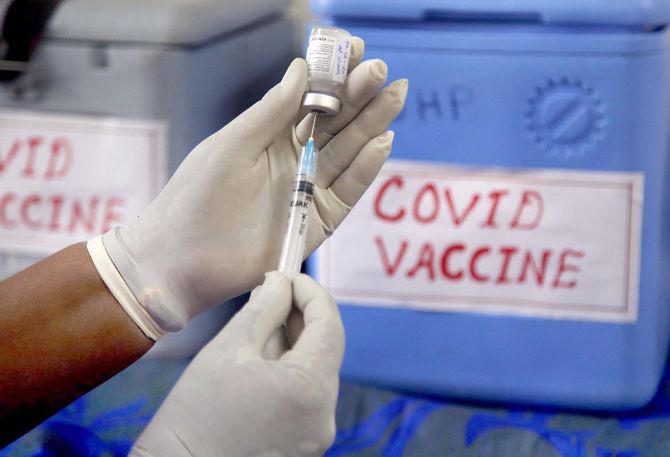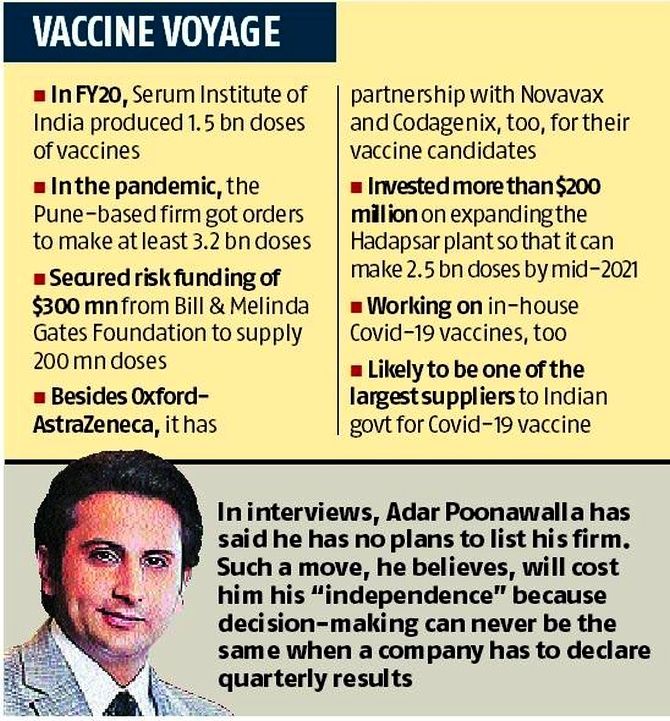The Covishield maker's forte throughout the past half a century has been a combination of affordable vaccines and high volumes. Its tetanus, diphtheria and measles vaccines are known throughout the world, reports Sohini Das.

Nestled in one of the oldest industrial estates in the country, in Pune, the 50-year-old Serum Institute of India has hogged the limelight since the pandemic began, by winning a commitment to supply 3.2 billion doses for the multiple Covid-19 vaccines it is working on.
Large volumes are nothing new for the institute. It is the world’s largest vaccine maker by volumes. Nonetheless, 3.2 billion doses is more than double the 1.5 billion doses it produced last year.
(To put these numbers into context, if 70 per cent of the world’s population is to be vaccinated, around 11 billion doses of two shots are needed for some 5.4 billion people).
The Hadapsar plant in Pune will supply one billion doses of the AZD1222 (or Covishield) to British major AstraZeneca and another two billion doses to US major Novavax.
The Serum Institute has also secured risk funding of around $300 million from the Bill & Melinda Gates Foundation to supply 200 million doses of these two vaccines at a fixed price of $3 per dose to the Vaccine Alliance, or Gavi, which has been set up to help the poorest countries get access to the vaccine.
CEO Adar Poonawalla has invested more than $200 million on expanding the Hadapsar plant so that it can make 2.5 billion doses by mid-2021.
When the pandemic hit, Poonawalla was convinced that long-term lockdowns would not help much. Instead, the world needed a vaccine, fast.
He was the amongst the first of his peers to start manufacturing the Oxford-AstraZeneca vaccine, which has now got emergency use authorisation, on what he called “personal risk”.
The first batches were used to conduct the clinical trials here and now Serum Institute has a stockpile of 50 million doses that it can readily supply with the Indian drug regulator giving final approval to the vaccine.
The “risk” he took gives the institute an edge over the other vaccines as India gets ready for one of the world’s largest vaccination drives.
Being ready with millions of doses will be a major advantage now as the government starts vaccinating the priority population.

In interviews, Poonawalla has said he has no plans to list his firm. Such a move, he believes, will cost him his “independence” because decision-making can never be the same when a company has to declare quarterly results.
Another key strategic decision the company took was to have multiple vaccine tie-ups and possibilities.
Apart from AstraZeneca and Novavax, it has tie-ups in place with Codagenix for another investigational vaccine candidate and has also been conducting clinical trials on a recombinant BCG vaccine in-house.
While it may look like a risky strategy to have set aside capacities for a Covid-19 vaccine, those at the Serum Institute disagree.
Suresh Jadhav, executive director, explained that the firm had already put in place an expansion plan for new products in the pipeline.
Around half a dozen new products are under development. These typically take five to seven years until the product is licensed.
The institute will need to ramp up capacities for new products if the demand for a Covid-19 vaccine persists.
Should demand for the vaccine dwindle, it will continue to use this enhanced capacity for other vaccines.
Serum Institute’s forte throughout the past half a century has been a combination of affordable vaccines and high volumes. Its tetanus, diphtheria and measles vaccines are known throughout the world.
In fact, its journey first started with the tetanus vaccine when Poonawalla’s father, Cyrus Poonawalla, set up a small laboratory in the corner of his stud farm in Pune to make tetanus vaccines from horse serum.
In the last decade or so, the Serum Institute has spread its wings globally. From supplying vaccines to 35 countries in 2005-06, it exports to 150 nations.
And now, it will turn into the global supplier of the Covid-19 vaccine.
Feature Presentation: Rajesh Alva/Rediff.com











